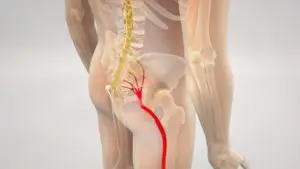
Causes of Sciatica
For most people, sciatica is more of an annoyance than an impairment. It only causes minor pain that goes away with the right therapy and treatment. Occasionally, though, sciatica can cause chronic pain that lasts for a year or more. This can make it difficult to walk or stand for long periods of time. It may even limit your ability to work.
If you can prove your pain or other related symptoms prevent you from earning a living, you may be eligible for Social Security Disability for sciatica.
The disability team from Berger and Green knows what it takes to get you approved for disability benefits. We offer free application reviews before you file. If the Social Security Administration (SSA) did not approve your claim, we can help you fight the denial during the appeals process. If you need help with your disability claim and live in Pennsylvania, Ohio, or West Virginia, call our office today at 412-661-1400.
40+ years of experience from strong, knowledgeable, compassionate attorneys.
Start A Free EvaluationDoes Sciatica Qualify for Disability Benefits?
Most conditions likely to cause a disability have a listing in the SSA’s Blue Book. This list of impairments outlines dozens of conditions and the criteria you must meet to qualify for benefits. Sciatica is not included in this list.
Often, however, sciatica pain and symptoms occur because of other spinal disorders. Many of these are in Section 1.04 of the Blue Book. These qualifying medical conditions may include:
- Herniated discs;
- Spondylolisthesis;
- Spinal stenosis;
- Ankylosing spondylitis;
- Piriformis syndrome;
- Traumatic injuries; and
- Tumors and other growths.
If you have any of these conditions and your doctor expects your symptoms to last for a year or longer, you may qualify for disability benefits. We recommend discussing your condition and diagnosis with your doctor and asking if they believe you are eligible for benefits. They can help you understand the guidelines for any applicable impairment listing. They can also ensure your medical records contain the documentation necessary to prove your disability.
We know you’re hurting. We can help. Free case evaluations, home and hospital visits.
Contact Us Now For HelpCan I Still Get Benefits If I Do Not Suffer From a Qualifying Medical Condition?
If you do not suffer from another qualifying condition, the best way to get disability benefits for sciatica is through your residual functional capacity (RFC). The SSA assigns your RFC based on your ability to perform specific work-related tasks. Your RFC is a statement of the type of work you can do, how often, and for how long. If you cannot work, the SSA will likely determine you have a qualifying disability.
The tasks included in an RFC evaluation cover a wide range of common workplace actions, as well as basic tasks you may need to complete throughout the day. This includes standing, sitting, squatting, lifting, activities requiring fine motor skills and dexterity, walking, and climbing stairs.
There are three ways the SSA may evaluate your RFC:
- A disability examiner from the SSA evaluates your abilities based on your medical evidence, application information, and other documentation;
- Your doctor conducts the evaluation and submits a worksheet to the SSA’s Disability Determination Services; or
- The SSA schedules an examination with a physician, who will complete the evaluation.
You need an attorney with the experience and dedication to give your case the care it deserves.
Start A Free EvaluationWhat Other Qualifications Do I Need to Meet for Disability?
The SSA administers two disability programs: Social Security Disability Insurance (SSDI) and Supplemental Security Income (SSI). In addition to providing medical evidence that you suffer from a qualifying impairment, there are also technical qualifications you must meet for each disability program.
How to Get SSDI Benefits
SSDI requires applicants to have a minimum number of work credits to get benefits. This means you need to have at least a part-time job for several years before you can qualify. The number of work credits you need depends on your age.
To get disability, your medical condition must prevent you from working. If you earn less than the SSDI monthly income limit, you will likely qualify for benefits if you are disabled. This limit only includes income you earned from working a job.
How to Qualify for SSI
There are no required work credits for SSI, but the program has much stricter limits on income and personal assets. The SSA will include many forms of income when calculating how much you earn each month. That is because this program is available only to the most economically disadvantaged families to help them make ends meet. We can help you understand the limits on your income and assets and see if you qualify.
We can address all the legal hurdles that may be keeping you from getting a fair settlement.
Speak To An Attorney TodayWhat If I Received a Denial?
The SSA sometimes denies deserving people who apply for benefits, so qualified applicants may run into this issue. If you receive a letter denying your disability benefits, there is no reason to panic. We can help you navigate the appeals process and fight for the monthly payments and back benefits you deserve.
You only have a short time after a denial to request an appeals hearing, so it is essential you call us today. We can get to the bottom of why the SSA denied your claim and present the administrative law judge with evidence of why they should overturn the decision. Usually, we can get qualified clients approved for benefits during this appeals hearing. When we cannot, there are other ways we can appeal the decision.
How Can I Talk to an Attorney in Pittsburgh About Getting Disability for Sciatica?
At Berger and Green, our disability team will work with you to help you get the monthly benefits you deserve. We can review your initial claim, request an appeals hearing, or even help you set up a medical examination to overturn a denial. Call our Pittsburgh office today at 412-661-1400 to get started.









